
Eupithecia is a large genus of moths of the family Geometridae. There are hundreds of described species, found in all parts of the world, and new species are discovered on a regular basis.

The foxglove pug is a moth of the family Geometridae found in Europe. It was described by the English entomologist James Francis Stephens in 1831.

The mottled pug is a moth of the family Geometridae. The species was first described by Jacob Hübner in 1813. It is found across the Palearctic region apart from around the Mediterranean Sea. It is common in the British Isles apart from Scotland where it is rather local.

The lime-speck pug is a moth of the family Geometridae. It is a common species throughout the Palearctic region, the Near East and North Africa.

The wormwood pug is a moth of the family Geometridae. The species was first described by Carl Alexander Clerck in 1759. It is a common species across the Palearctic region as well as North America.

The common pug(Eupithecia vulgata) is a moth of the family Geometridae. It is a common species across the Palearctic region, including the Near East and North Africa. It ranges from the Atlantic coast of Ireland and Portugal across Europe, the Middle East and Central Asia to the Russian Far East (Priamurje) and Korea.

The grey pug is a moth of the family Geometridae. It is found throughout the Palearctic region. It is also found in North America. Since it does not place any special demands on climatic conditions, special caterpillar food plants, geological subsoil or the like it is a typical species of almost any Hochstaudenflur, where it occurs in the herb layer, in bushes and even on deciduous trees. It can be found on forest edges and hedgerows, on heath, in rocky places and wetlands, parks and gardens, as well as in villages and town centres.
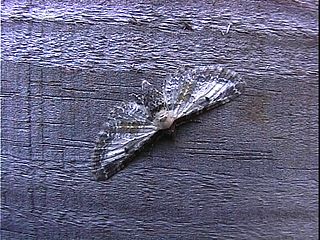
The bordered pug is a moth of the family Geometridae. It is found across the Palearctic region. In the Pyrenees, the species can be found up to an altitude of 1800 metres. It prefers steppe areas, open bushy terrain, fallow and unimproved grasslands and parkland.

The goldenrod pug is a moth of the family Geometridae. The species was first described by Henry Doubleday in 1861. It is found throughout the Palearctic region. In the British Isles it is widespread but rather locally distributed.

The juniper pug or juniper looper is a moth of the family Geometridae. The species was first described by Michael Denis and Ignaz Schiffermüller in 1775. It is found throughout the Palearctic and in the Nearctic.
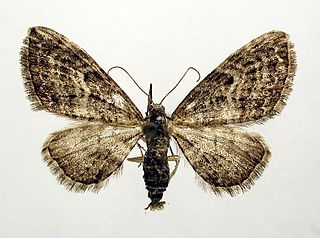
The larch pug is a moth of the family Geometridae. The species can be found in Europe, the Ural Mountains, West and Central Siberia, the Altai Mountains, Transbaikalia, Yakutia, the Far East, Mongolia, Korea, Japan and in North America, from Yukon and Newfoundland to New York and Arizona.
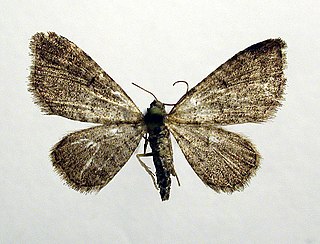
Eupithecia plumbeolata, the lead-coloured pug, is a moth of the family Geometridae. The species can be found all over Europe ranging to the Urals, then through Central Asia to Siberia and to Sayan mountains, the Altai and the Amur. In the Alps, the species occurs up 2000 metres above sea level and in the Pyrenees up to in 2400 metres.
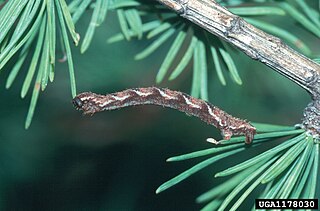
Eupithecia fletcherata, or Fletcher's larch looper, is a moth of the family Geometridae described by George Taylor in 1907. It is found in Canada and the north-eastern parts of the United States.

Eupithecia venosata, the netted pug, is a moth of the family Geometridae. It was first described by Johan Christian Fabricius in 1787. It is found across the Palearctic realm from Portugal and Morocco in the west to the Lake Baikal in Siberia and Afghanistan and Pakistan in the east.

Eupithecia denotata is a moth in the family Geometridae. The species can be found across the Palearctic from western Europe to Central Asia and China.
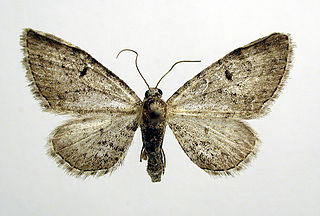
Eupithecia pimpinellata, the pimpinel pug, is a moth of the family Geometridae. The species was first described by Jacob Hübner in 1813. It is known from most of Europe to Morocco, Siberia, Kyrgyzstan, Altai, Mongolia.It primarily colonizes bushy places, forest edges, clearings, hedges, mountain slopes, embankments, railway dams and parks as well as semi-dry grasslands. In the Alps it rises to heights of 1800 metres.
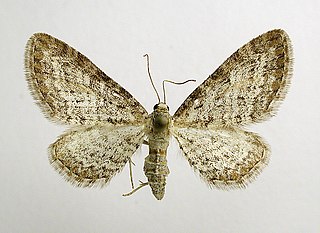
Eupithecia subumbrata, the shaded pug, is a moth of the family Geometridae. The species was first described by Michael Denis and Ignaz Schiffermüller in 1775. It is found from Mongolia and the Altai Mountains through Siberia, central Asia, Asia Minor and Russia to western Europe and from central Scandinavia to the Mediterranean region.

Eupithecia expallidata, the bleached pug, is a moth of the family Geometridae. It is found in North-West and Central Russia, South-East Scandinavia to the North Mediterranean and West Europe including the British Isles.

Eupithecia druentiata is a moth in the family Geometridae. It is found in France, Spain, Italy, Austria, Slovenia and most of the Balkan Peninsula.
Eupithecia strattonata is a moth in the family Geometridae. It is found from Newfoundland and Labrador and Nova Scotia to Ontario and bordering areas in the north-eastern United States. The habitat consists of damp fields and open areas, abandoned pastures, marshes, bogs or other flat wet areas.





















